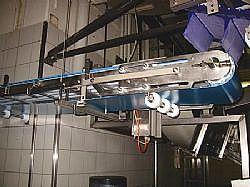This new belt has been specifically designed for direct food contact with raw foods such as meat, poultry, fish, fruit and vegetables, as well as many other applications.
While solid polyester and urethane conveyor belting is not new, it has had a number of problems involved with elongation due to the high belt tensions required to enable the belt to drive on a standard style friction drum.
Thermodrive overcomes this by having lateral teeth machined the full width on the underside of the belt at either 50mm or 26mm pitch. These teeth are designed to engage with industry standard modular plastic conveyor belt sprockets, which gives Thermodrive belting positive drive with virtually zero belt tension. This eliminates historical problems such as maintaining belt tracking, belt stretch and edge damage.
Thermodrive is manufactured from a tough polyurethane blend or polyester and is much more cut and damage resistant than conventional fabric reinforced conveyor belts.
In the past some industries have installed modular plastic belts to obtain a positively driven robust belt, but these have a major hygiene problem due to the many small crevices where bacteria can accumulate. These areas are difficult to clean and sanitise properly and in an attempt to do so, expensive and complex cleaning stations have been installed on each application. These use a considerable amount of water, which must be paid for and disposed of.
Because Thermodrive is a flat homogenous belt, cleaning is greatly simplified, and due to the low belt tension, the belt can easily be lifted away from the conveyor structure to facilitate cleaning on the underside of the belt.






